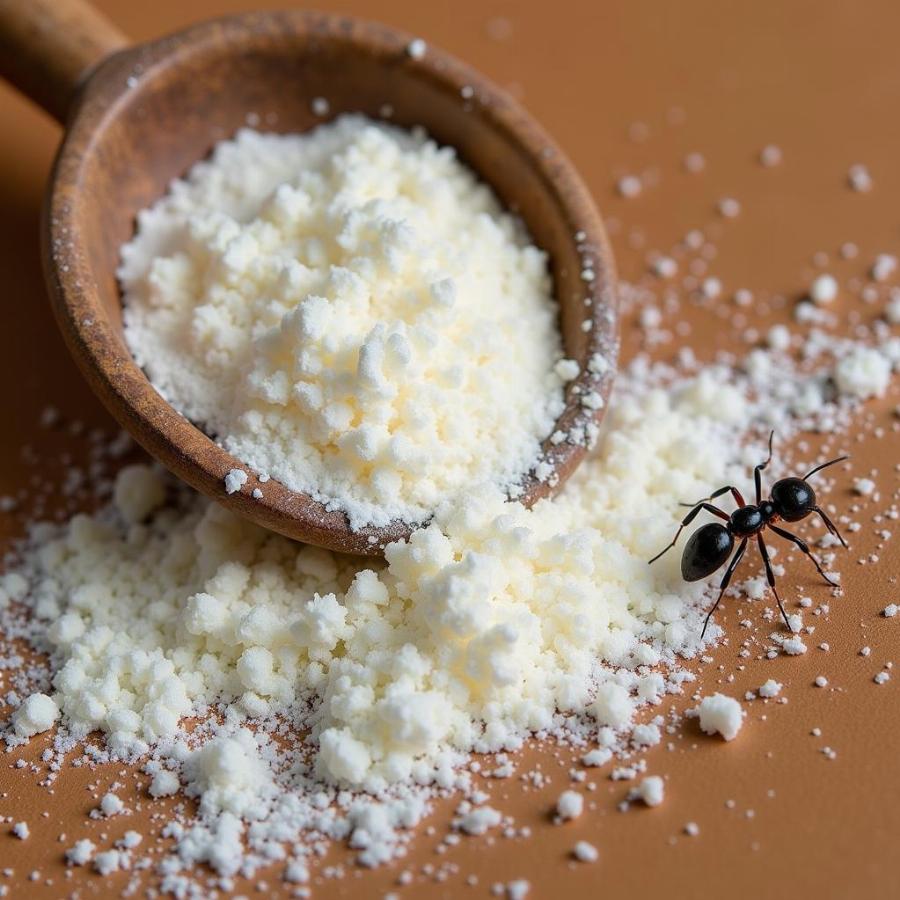Boric acid powder for dogs is a topic that often comes up when pet owners are looking for ways to control pests in their homes. While boric acid is sometimes touted as a “natural” pest control solution, its safety for our canine companions is a complex issue that requires careful consideration. This article will delve into the potential risks and benefits of using boric acid around dogs, helping you make informed decisions to protect your furry friend while keeping your home pest-free.
Understanding Boric Acid and its Uses
Boric acid is a chemical compound derived from boron, a naturally occurring element. It’s commonly used as an insecticide, particularly against ants, roaches, and fleas. It works by disrupting the insects’ nervous systems and digestive tracts, eventually leading to their demise. Because it’s often marketed as a “natural” solution, many pet owners assume it’s completely safe to use around their dogs. However, this isn’t necessarily the case. While boric acid is generally considered less toxic than some other chemical insecticides, it can still pose health risks to dogs, especially if ingested in large quantities or used improperly.
 Boric Acid Powder and Ants
Boric Acid Powder and Ants
Is Boric Acid Poisonous to Dogs?
The toxicity of boric acid for dogs depends on several factors, including the dog’s size, age, overall health, and the amount of boric acid ingested. While small amounts of boric acid are unlikely to cause severe poisoning in adult dogs, puppies and smaller breeds are more susceptible to its toxic effects. Ingestion of larger amounts can lead to a range of symptoms, from mild gastrointestinal upset to more serious issues like tremors, seizures, and even kidney failure. Skin contact with boric acid can also cause irritation, especially in dogs with sensitive skin. Therefore, it’s crucial to take precautions when using boric acid in your home if you have a dog.
Safe Practices for Using Boric Acid Around Dogs
If you decide to use boric acid for pest control, it’s essential to do so responsibly to minimize the risk to your dog. Here are some key safety guidelines:
- Use boric acid sparingly: Apply it only in areas where pests are a problem, avoiding areas where your dog spends a lot of time.
- Place boric acid out of reach: Apply it in cracks and crevices, under appliances, or in other areas inaccessible to your dog. Consider using bait stations designed to keep the powder contained.
- Clean up spills immediately: If any boric acid spills, clean it up thoroughly right away.
- Monitor your dog: Watch for any signs of boric acid ingestion, such as vomiting, diarrhea, lethargy, or tremors. If you suspect your dog has ingested boric acid, contact your veterinarian immediately.
- Consider alternatives: Explore dog-safe ant killer options, like diatomaceous earth or certain essential oil-based sprays.
What to Do if Your Dog Ingests Boric Acid
If you believe your dog has ingested boric acid, seek veterinary care immediately. Time is of the essence in treating boric acid poisoning. Your veterinarian may induce vomiting or administer activated charcoal to help absorb the toxin. They may also provide supportive care, such as fluids and medications, to manage symptoms and prevent complications. Do not attempt to treat your dog at home without professional guidance.
Natural Pest Control Alternatives for Dog Owners
Fortunately, several safer alternatives to boric acid are available for pet owners. Diatomaceous earth, a naturally occurring sedimentary rock, is a non-toxic option that works by dehydrating insects. Certain essential oils, like peppermint and citronella, can also repel pests. However, it’s important to use essential oils with caution around dogs, as some can be toxic. Always consult with your veterinarian before using essential oils near your pet. Other options include traps and professional pest control services.
Can I use boric acid powder if I have a dog?
The answer isn’t a simple yes or no. While it’s possible to use boric acid in a home with dogs, it requires careful planning and diligent application to minimize the risk of exposure. If you’re unsure whether using boric acid is the right choice for your situation, consult with your veterinarian or a professional pest control service. They can help you assess the risks and benefits and recommend the safest and most effective pest control strategy for your home.
Conclusion
Boric acid powder for dogs presents a delicate balance between pest control and pet safety. While it can be an effective insecticide, it’s crucial to be aware of the potential risks and take appropriate precautions to protect your furry friend. By following safety guidelines, exploring alternatives, and seeking professional advice when needed, you can maintain a pest-free home without compromising your dog’s well-being. Remember, your dog’s health and happiness are always the top priority.
FAQ
- What are the signs of boric acid poisoning in dogs?
- Are there any dog breeds more susceptible to boric acid toxicity?
- What are the best dog-safe ant killers?
- How can I prevent my dog from accessing boric acid?
- When should I call a veterinarian if I suspect boric acid ingestion?
- What are the long-term effects of boric acid exposure in dogs?
- Can I use boric acid in my yard if I have a dog?
Related Topics
Beaut Dogs is your go-to resource for all things related to dog care, offering expert advice and valuable insights into the world of canine companionship. From breed information to health and training tips, we provide comprehensive information to help you provide the best possible care for your beloved pet. For personalized guidance and answers to your specific questions, don’t hesitate to contact us at [email protected]. We’re here to support you on your journey as a responsible and loving dog owner! Visit Beaut Dogs today.